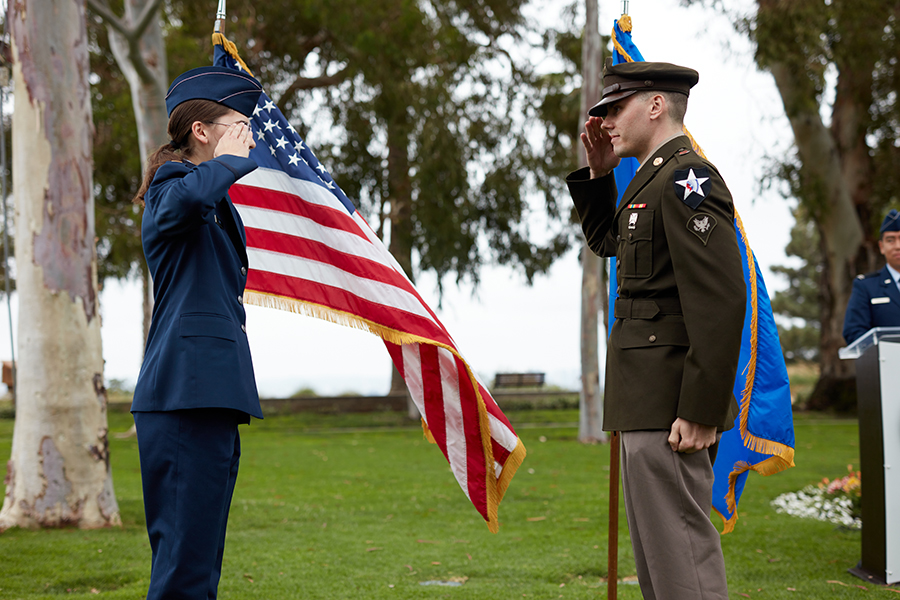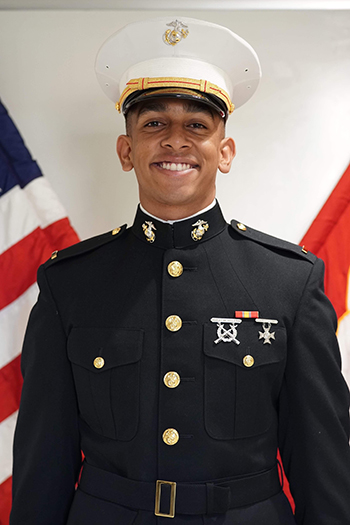
Sathya Manoharan ’23, a former U.S. Marine Corps artillery officer, remembers the moment when he realized he wanted to become a doctor. He is currently enrolled in the Pre-Medical Post-Baccalaureate Program at Loyola Marymount University (LMU).
“I had just returned from a deployment to Okinawa, Japan, and a conversation with our naval doctors inspired me to volunteer at a trauma emergency room. I immediately felt that this was the place for me – the way the medical team was run had a lot of parallels with the Marine Corps, and I recognized that adrenaline rush of having to make rapid decisions in a high-pressure environment. There was a sense of belonging – this was something I could see myself doing for the rest of my life.”

The experience prompted Manoharan to rethink his career, and he applied to LMU as a post-bac pre-med student. Post-bac students are not eligible to receive the GI Bill, so the decision to re-enter higher education was a significant financial investment. Thankfully, private funding from individual donors and foundations ensure that student veterans are supported throughout their university journey, both in terms of financial backing and the LMU Veteran Programs. “I’m grateful for the scholarship I received, because it allowed me to continue my education and pursue my goal of becoming a doctor,” said Manoharan. “This summer, I was able to take classes in organic chemistry thanks to the additional funding I received.”
Military training can equip individuals with an unparalleled sense of dedication and rigor, and scholarships play an important role in enabling veterans to fulfill their academic potential. “Growing up, I felt that being in the military was one of the most selfless things you could do, and I just wanted to be around other people who had that same desire to serve. Whatever shape my career ends up taking, it’s clear to me that it will be deeply involved in service to some capacity – whether to country or community.”
LMU’s emphasis on service and social justice was appealing to Manoharan when he was applying to colleges, and so was the commitment to the care of the whole person. “The quality of the education and the attentiveness of the professors is monumentally higher than what I’ve experienced in the past,” he said. “The small class sizes really suit my learning style, and it’s clear that the professors truly care about each individual student – they’re personally invested in our success.”
Manoharan is currently preparing to enter medical school, and he hopes to train as an emergency room doctor – potentially returning to the military and serving as a doctor deployed with combat units. “One key similarity between being a doctor and a Marine is that central focus on competence,” he explained. “It’s not about you – the only thing that matters is how good you are at your job. The stakes are high, your decisions have serious consequences, and your team is relying on you.”
Resilience, persistence, motivation; these are qualities shared by LMU student veterans and celebrated by deeply impactful private grants. When veterans leave the military, readjustment can be hard, but when given the backing to thrive, they stand every chance of achieving truly extraordinary things in their future careers.
To support student veterans, contact Carí Jackson Lewis, J.D., LL.M., ’17, executive director of development for gift planning, at 310.338.2920, cari.lewis@lmu.edu. You can also directly support student veterans at LMU here, and student veterans at LMU Loyola Law School here.



